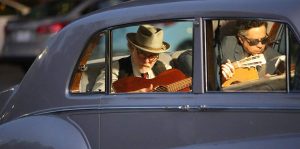
I did not grow up with Elvis Presley music, as my parents are not fans of his. As such, my knowledge of Elvis’s work is limited to a handful of his movies, such as Jailhouse Rock viewed as part of a cinema history class, a few of his biggest hit songs, and just general pop culture saturation (the Epic Rap Battles Of History with Elvis is fantastic). My primary sources for information about the King of Rock N Roll are the movies Lilo And Stitch and Bubba Ho-Tep, and no, I am not joking.
I was so ignorant about Elvis that I was under the assumption that he was much older than 42 when he died. My guess was off by over ten years, and I only discovered that thanks to the documentary The King. Directed by Eugene Jarecki, the premise is simple in its conceit. One of Elvis’s Rolls-Royces gets a restoration and Jarecki takes it on the road, interviewing celebrities, fans, and people who happen to live where the rockstar use to reside.
These interviews are interspersed with archival footage, musical performances, and news stories all relating to, or directly spoken by (or performed, etc.), Elvis. Parallels are drawn between the United States of America’s societal and political upheaval going on at the time and the modern campaign of one Donald J. Trump (this was filmed before the 2016 election). This stance gives The King a relevance that a more straightforward narrative towards Elvis’s life could not achieve.

“One of Elvis’s Rolls-Royces gets a restoration and Jarecki takes it on the road, interviewing celebrities and fans…”
The movie does a splendid job of highlighting his early love of music, the wheeling, and dealing that led to his first record being produced and played on the radio, and the subsequent explosion of popularity in that song’s aftermath. Using speeches from politicians to put that era’s society into proper perspective, it is clear that the youth felt not only under-represented but unfairly so as well. Their attachment to a public figure who defied common norms and decorum gave them their own icon.
Ethan Hawke is sitting in the car, espousing how his roommate (at the time) loved Elvis and got him turned onto the King. He discussed, with great detail, how all these particular elements had lined up just so, and thus, the Elvis Presley everyone knows was born. His passion for the man’s music comes through in each word.
Ashton Kutcher is on hand as well, as he pontificates on how fame can mess with people’s expectations of you. Your skill set is at a particular level but because you are famous many people expect you to be good at any number of things, only some of which may qualify under your specific purview. It is, however, Austin Powers himself, Mike Myers that is the most eloquent and well spoken. As a Canadian, he discusses the moment he discovered that the US had an excellent new export – iconography and popular culture. He obviously knows his Elvis history, and that makes him a fascinating interviewee.

“Exploring societal and political climates during his reign atop the charts allows for a timely watch…”
There is an issue with the documentary that needs to be addressed, though. Oddly enough, for such a central component to the film, the Rolls Royce is largely left devoid of context. Friends or fellow musicians sit in the car, a few weeping with a flood of memories of Elvis. But why was this car the vehicle to represent Elvis? Was it the only car he’d drive? Well, no, he owned a BMW or two, roughly a dozen different Cadillacs, a Volkswagen Beetle, and two different Rolls Royces, this one included.
Just from an iconography standpoint, even with my minimal knowledge of the man, I know that Elvis plus cars equal a pink Cadillac. I am not sure what I am missing about this particular Rolls Royce, but it is an odd disconnect between the audience and the movie without more context.
The King is exhaustive in its scope, covering Elvis Presley’s life and music. Exploring societal and political climates during his reign atop the charts allows for a timely watch. But, it does not go far enough in explaining certain elements that friends, fellow musicians, fans, or artists wax nostalgic on; such as the iconic, central Rolls Royce. Elvis fans will love it, anyone else will appreciate it, but will not feel the need to rewatch.

The King (2018) Directed by Eugene Jarecki. Written by Eugene Jarecki, Christopher St. John.. Starring Ethan Hawke, Ashton Kutcher, Chuck D, Alec Baldwin, Emi Sunshine, Emmylou Harris, James Carville, Mike Myers.
6.5 Gummi Bears (out of 10)



I disliked this movie more the second time I watched it.
How can you get the true meaning or feeling of what Elvis meant if you basically have no knowledge of the subject? Writing a review of a movie on a topic you know nothing about is like telling your audience what a recipe tastes like without ever trying it.
Cory Cooper
Elvis Historian
ElvisExpert@aol. com
This movie spent a lot of time on people saying he was a racist and neve did anything to help the black cause.This is nonsense and has been proved so.He had many black musician friends and use black back up singers in his Las Vegas shows and on many records.I did not like this movie at all.
The problem with only knowing abiut Elvis after watching “Jailhouse Rock” is that you miss the best of Elvis, namely and these are juisy ab vfew examples, the 21 year old who stood in front of the entire world’s press on October 28, 1956, to be inoculated with the third version of Dr. Jonas Salk{s polio vaccine (the first two had cause deaths) and by doingo, became the prime mover in the excponential increase in the immunization level of all Americans, from 0.6% to 80% in a six month period. Or the one who,. two days short of his 22nd birthday, launched an emergency appeal for the 250,000 Hungarians then fleeing the Soviet Union, which brought in contributions exxeeding US$6 million (US$49.5 m in today’s dollars) all of qwhich the IRC in Geneva distributed in perishablers and non perishabbles to the quarter million refugees in England and Austria, where they settled for life. In 2011, the Mayor of Budapest namend a park after him, as a gesture of gratitudwe. It faces the cityy{s oldest crossing, thwe Margret Bridge. He also made him an honorary ciitizen, tjhe onkly American to have that distinction, joining inter-alia, Swedish martyr and diplomat Raoul Wallenberg, Polish Activist, President and Nobel Peace Prize laureate Lech Walesa, Czech leader Václav Havel and Edward Teller. father of the Hydrogen bom, the latter an Hungarian who became an American during his time at Los Alamos. I bet the King didnt mention any of this.
I totally agree……Elvis did study and learn a lot from gospel and rhythm and blues, but to say he did nothing for blacks is preposterous. He did everything for everyone, and the guy saying he made all these choices based on money…..look at all athletes, or anyone in entertainment. And, to follow what was going on in America, and compare that to Elvis, maybe you should “walk a mile in his shoes”. This movie was BS as far as I am concerned, as an Elvis fan, and what he had to go through to get where he ended up. How many young HUGE artists have not made it, due to OD, or whatever has happened to them. FAME AND FORTUNE….is just a passing thing. I would say if you’re an Elvis fan, you will not like this movie, or documentary comparing it to America and racism, because Elvis was NOT a racist, and just because he wasn’t out there marching with them?? Wow…..you can watch it, but IMO, you will want to defend your Elvis, and I think this movie had some good points, but mostly bad, by some people who ought to turn around and look in the mirror. THIS IS JUST MY OPINION, may not be yours, but I think the film stunk…..including hanging it on him for owning a Rolls…..and saying wow, how British, where is his Cadillac? So ridiculous of a comparison. THIS MOVIE IS WORTH WATCHING, BUT IT MAKES AN ELVIS FAN SKEPTICAL, and disappointed. BOO-HISS!! E tried to bring everyone together, not divide them like this film portrays. TERRIBLE FILM!! I think some of the folks who spoke about him, knew nothing about him…….